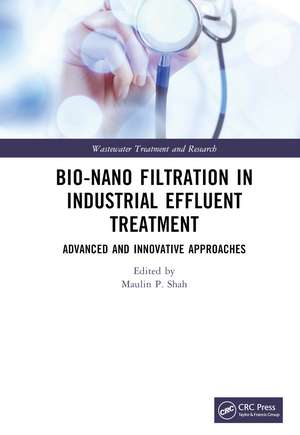Bio-Nano Filtration in Industrial Effluent Treatment: Advanced and Innovative Approaches: Wastewater Treatment and Research
Editat de Maulin P. Shahen Limba Engleză Hardback – 27 apr 2023
Bio-nano filtration is a relatively new emerging technology applied to the treatment of wastewater and other toxic compounds. In the last two decades, this technology has begun to emerge as an economically viable process to treat the great variety of recalcitrant pollutants discharged into the environment. Thus, it is speculated that the US biofiltration market will reach over $100 million by 2020. This book aims to present how innovation in bio-nano filtration can provide effective solutions to overcome the serious problem of water pollution worldwide. The removal of contaminants will be the result of the combined effects of biological oxidation, adsorption, and filtration processes.
Features:
- Describes the microbial ecology of bio-nano filtration.
- Describes the modelling of bio-nano filtration.
- Describes the design of bio-nanofillers.
Preț: 841.18 lei
Preț vechi: 1025.82 lei
-18% Nou
Puncte Express: 1262
Preț estimativ în valută:
160.96€ • 168.05$ • 133.21£
160.96€ • 168.05$ • 133.21£
Carte tipărită la comandă
Livrare economică 04-18 aprilie
Preluare comenzi: 021 569.72.76
Specificații
ISBN-13: 9780367760137
ISBN-10: 0367760134
Pagini: 204
Ilustrații: 9 Tables, black and white; 20 Line drawings, color; 4 Line drawings, black and white; 6 Halftones, color; 26 Illustrations, color; 4 Illustrations, black and white
Dimensiuni: 178 x 254 x 19 mm
Greutate: 0.58 kg
Ediția:1
Editura: CRC Press
Colecția CRC Press
Seria Wastewater Treatment and Research
ISBN-10: 0367760134
Pagini: 204
Ilustrații: 9 Tables, black and white; 20 Line drawings, color; 4 Line drawings, black and white; 6 Halftones, color; 26 Illustrations, color; 4 Illustrations, black and white
Dimensiuni: 178 x 254 x 19 mm
Greutate: 0.58 kg
Ediția:1
Editura: CRC Press
Colecția CRC Press
Seria Wastewater Treatment and Research
Public țintă
Postgraduate and ProfessionalCuprins
Chapter 1: Biofiltration based methods for the removal of volatile organic compounds and heavy metals in industrial effluent treatment plants
Chapter 2: Bio-based Iron-Nanoparticles (NPs) Incorporated Polymeric Nano-filtration Membranes (PNCMs) for Wastewater Treatment
Chapter 3: Nanofiltration: Unravelling the potential of the future
Chapter 4: Recent advances in biological remediation of volatile organic compounds (VOCs)
and heavy metals
Chapter 5: Tailor-made microbial wastewater treatment
Chapter 6: Systematic Industrial Waste Water Treatment by Biomaterial Fabricated Nanofiltration Membrane
Chapter 7: Biological based methods for the removal of VOCs and heavy metals
Chapter 8: Bacterial Biofilters for Arsenic Removal
Chapter 9: Bionanoparticle: synthesis & application in wastewater treatment
Chapter 10: Applications of Nanofiltration for wastewater treatment
Chapter 11: Bio-nano filtration as an abatement technique used in the management and treatment of impurities in industrial wastewater
Chapter 12: Removal of VOC and Heavy Metals through Microbial Approach
Chapter 2: Bio-based Iron-Nanoparticles (NPs) Incorporated Polymeric Nano-filtration Membranes (PNCMs) for Wastewater Treatment
Chapter 3: Nanofiltration: Unravelling the potential of the future
Chapter 4: Recent advances in biological remediation of volatile organic compounds (VOCs)
and heavy metals
Chapter 5: Tailor-made microbial wastewater treatment
Chapter 6: Systematic Industrial Waste Water Treatment by Biomaterial Fabricated Nanofiltration Membrane
Chapter 7: Biological based methods for the removal of VOCs and heavy metals
Chapter 8: Bacterial Biofilters for Arsenic Removal
Chapter 9: Bionanoparticle: synthesis & application in wastewater treatment
Chapter 10: Applications of Nanofiltration for wastewater treatment
Chapter 11: Bio-nano filtration as an abatement technique used in the management and treatment of impurities in industrial wastewater
Chapter 12: Removal of VOC and Heavy Metals through Microbial Approach
Notă biografică
Maulin P. Shah is very interested in genetic adaptation processes in bacteria, the mechanisms by which they deal with toxic substances, how they react to pollution in general and how we can apply microbial processes in a useful way (like bacterial bioreporters). One of his major interests is to study how bacteria evolve and adapt to use organic pollutants as novel growth substrates. Bacteria with new degradation capabilities are often selected in polluted environments and have accumulated small (mutations) and large genetic changes (transpositions, recombination, and horizontally transferred elements). His work has been focused to assess the impact of industrial pollution on microbial diversity of wastewater following cultivation dependant and cultivation independent analysis. He has more than 280 research publication in highly reputed national and international journals. He is Editorial Board Member in CLEAN-Soil, Air, Water- Wiley, Current Pollution Reports- Springer Nature, Environmental Technology & Innovation-Elsevier, Journal of Biotechnology & Biotechnological Equipment-Taylor & Francis, Current Microbiology- Springer Nature, Eco toxicology (Microbial Eco toxicology)-Springer Nature, Geo Microbiology- Taylor & Francis , Applied Water Science - Springer Nature, Archives of Microbiology-Springer, Journal of Applied Microbiology-Wiley, Letters in Applied Microbiology-Wiley, Green Technology, Resilience and Sustainability-Springer, Biomass Conversion & Bio refinery-Springer, Journal of Basic Microbiology-Wiley, Energy Nexus-Elsevier, e Prime – Elsevier, IET Nano biotechnology-Wiley, Cleaner and Circular Bioeconomy – Elsevier, International Microbiology - Springer has edited 75 books in wastewater microbiology, industrial wastewater treatment. He has edited 20 special issues on Industrial Wastewater Treatment & Research theme on highly impact factor journals with Elsevier, Springer, Wiley, Taylor & Francis.
Descriere
The ever-increasing number of pollutants discharged into the environment drives the search for new treatment technologies or the modification of the existing ones. In this sense, innovation in bio nanofiltration systems seems very promising and therefore, a book on the current advances and innovations on his topic is highly appropriate.




